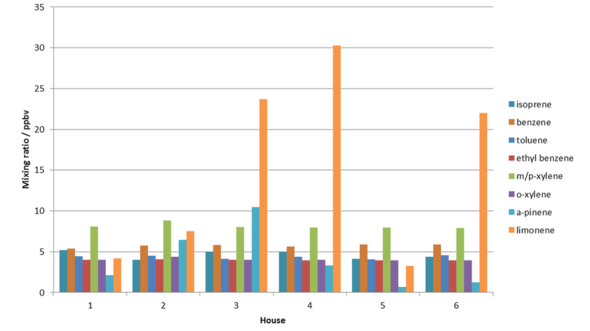Chemicals Released From Citrus-Scented Candles And Cleaning Products May Increase Cancer Risk

Citrus scents may make your home smell clean, but it may also permeate a cocktail of cancerous chemicals into the same air you and your family breathe. A team of researchers from BBC's "Trust Me, I’m A Doctor" worked with Alastair Lewis, a chemistry professor from the National Centre for Atmospheric Science, to investigate the potential health hazards attached to lemony-fresh aromas. What they found may make you want to toss out your favorite candle and opt for a safer cleaning scent.
For the study, researchers sampled the air in six homes throughout York, England, over the course of five days, looking at a range of volatile organic chemicals (VOCs). They tested each air sample in the lab and found the VOC that blatantly spiked was limonene, the scent that's added to candles and cleaning products to give them a lemony scent. For every two molecules of limonene released into the air via a scented candle or cleaning product, one molecule of formaldehyde was formed. The three houses that frequently used these products had such high levels of limonene, prompting researchers had to readjust their tests so they could capture the full range of chemicals.

Limonene is fairly safe when it's blended together with other chemicals, but it's dangerous to inhale on its own. When it mixes with airborne elements in your kitchen, living room, or bedroom, limonene can become formaldehyde — a carcinogen that burns the eyes, irritates the skin, and incites coughing fits, nausea, as well as nose and throat cancers.
According to the National Cancer Institute, humans are very sensitive to formaldehyde exposure when absorbed through the skin or inhaled through the mouth or nose; it has both short-and long-term effects. In 1980, laboratory studies showed rats exposed to formaldehyde later developed nasal cancer, with follow-up studies demonstrating similar exposure had the same affect on humans. Prolonged exposure from seemingly innocuous and common household products may be a hidden danger for many homes.
Detox Your Home
Once the research team discovered the potential dangers of airborne limonene, they set out to find a way to reduce formaldehyde in the air. So they conducted a second experiment, in which they placed houseplants in the same environments laced with limonene and formaldehyde. After testing various plants, they found lavender, spider ferns, guava, grub ferns, squirrel's foot ferns, and Japanese royal ferns were the most effective at reducing airborne chemical agents.
Researchers also recommended people simply cutback on the amount of limonene-infused products they use at home. Check the back of air fresheners, fragranced cleaning products, and scented candles to see if it contains limonene. If the chemical is listed, consider trying a new scent or a fragrance-free option. And don't forget to open windows after using a candle or cleaning product — it diffuses rather than concentrates the chemicals released into the air.



























